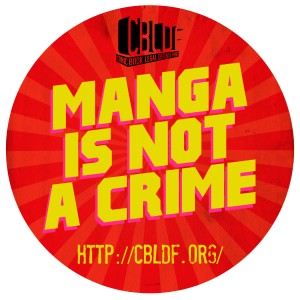 Earlier this month, CBLDF received word that editors of the popular Japanese comics publication Core Magazine pleaded guilty to charges of obscenity. The conviction marks an escalation in the assault on free expression in the Japanese manga industry by Tokyo authorities, and the repercussions could travel to what global otaku will read in their home countries.
Earlier this month, CBLDF received word that editors of the popular Japanese comics publication Core Magazine pleaded guilty to charges of obscenity. The conviction marks an escalation in the assault on free expression in the Japanese manga industry by Tokyo authorities, and the repercussions could travel to what global otaku will read in their home countries.
• CBLDF Case Files – R. v. Matheson
In July, Akira Ōta, who heads the editorial department at Core Magazine, was among three people who were arrested in Japan amid accusations of obscenity. According to CBLDF’s source in Japan, the Core Magazine case went to court, and despite predictions of a court fight, the defendants took the guilty plea.
“This guilty plea is another scary landmark that, at best, will chill expression in Japan in a way that affects content being exported globally,” says CBLDF Executive Director Charles Brownstein. “At worst, it will increase global scrutiny of manga, leading to free speech implications and to legal vulnerability for readers and retailers in the USA.”
Those arrested were accused of selling magazines and manga that had sexual content that was insufficiently censored, a violation of Article 175 of the Japanese Penal Code, which forbids obscene content. The Core Magazine defendants likely pled guilty because Japanese authorities backed away from some of the charges, so they felt the guilty plea would be a better option than a protracted legal battle.
• Vague Legal Definitions Threaten Japanese Comic Readers
Translator, manga expert, and CBLDF guest blogger Dan Kanemitsu has reported on the story extensively. In a post for his blog, Dan Kanemitsu’s Paper Trail, Kanemitsu describes how material is supposed to be censored in order to avoid obscenity accusations. From his post entitled “Orwellian Obscenity“:
For nearly 10 years, the industry standard was that obscuring the crown of the penis (the part that funnels out near the tip,) and clitoris, and instances of physical contact that constitutes sexual intercourse (i.e. insertions of objects into the vagina or the rectum) would absolve the depiction as being obscene. The police seemed also to reinforce this mantra, as they encouraged censorship of the kari (crown,) kuri (clitoris,) and the setsugou-bu (point of contact) and no more.
However, it appears that Japanese police have been taking upon themselves to mandate more censorship. Kanemitsu writes:
It appeared that the police had declared war on genitalia in adult material marketed and sold to adults. Previously, the police arrested and penalized material that were uncensored but left alone material if the genitals has been partially obscured by black boxes or filters. But after May of 2013, it appeared that the police was demanding more self-censorship out of the publishers.
Brownstein explains further: “Cultural attitudes about comics in the global world often foster problematic trends in law enforcement. Japan responded to Western prosecutions of manga content in part by changing its laws with regard to manga. Now we have an instance where individuals in the creative infrastructure of the field are being made an example by overreaching police investigation. The situation in Japan is such that the police have near-absolute power and inconsistently enforce vaguely defined standards.”
• Tokyo Olympics Emboldens Censors
Ōta denied the charges levied against him, but one of the individuals arrested reportedly admitted guilt. Anime News Network reported on the July arrests, describing the material that brought the charges:
The three suspects are accused of selling about 24,500 copies of the manga magazine Comic Mega Store with sex scenes between males and females this past March. They are also accused of selling about 36,000 copies of Nyan 2 Club, a magazine for reader-submitted adult photographs. Both magazines were marked with the 18+ label.
In the wake of the July arrests, many publishers in Japan have increased their self-censorship to avoid obscenity charges. Doujinshi events like Comic Market have strengthened their policies as well, holding the creators of fan-drawn comics to the same standards guidelines as the publishers. The guilty plea from Core Magazine may lead to further self-censorship. Kanemitsu predicts that the actions of Japanese censors will have a more universal impact:
While this debate might be taking place in Japan, the outcome of this debate may impact the quality of entertainment you enjoy in your own home nation. After all, many agree that Japan is at the vanguard for many forms of visual entertainment. Even those that dislike Japanese erotic fantasy will agree, Japan boasts tremendous diversity in the realm of fiction that is unavailable else where.
Alas, if one of the most liberal lands of fiction is muzzled, what will become of lands that are less liberal?
• The Inconvenience of Barefoot Gen
Earlier this year, Brownstein traveled to Tokyo for the Manga Freedom Speaking Tour, a series of presentations and meetings about free expression issues facing manga and how fans in the United States and Japan can band together to protect the rights of the medium and its readers. The Core Magazine case is a disquieting development for Japan’s vast manga culture, and one more example of why CBLDF works so hard to educate people about manga with speaking tours and publications like CBLDF Presents Manga: Introduction, Challenges, and Best Practices.
• CBLDF’s Comic Market Speech On Manga Freedom
We need your help to keep fighting for the right to read in 2014! Help support CBLDF’s important First Amendment work by visiting the Rewards Zone, making a donation, or becoming a member of CBLDF!
Thanks to Dan Kanemitsu for keeping CBLDF apprised of the ongoing legal battles and censorship in Japan.